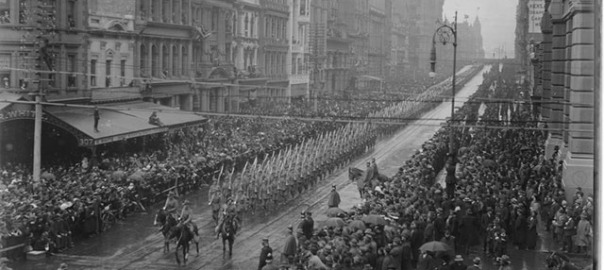Resources for the classroom

The 100 Stories project is aligned with Australia’s History Curriculum and canvas a wide range of historical issues. They foster skills at the heart of critical inquiry and offer new empathetic ways of recovering past experience. The 100 Stories have been showcased in thousands of classrooms since the project began. Here are some practical hints on how you might use them.
How do I use these stories to teach about the Great War and armed conflict generally?
These stories are best suited for use by senior students (years 9 and above). They are not intended to be screened to a class in a single sitting but are best used selectively, in accordance with your specific interests and needs. We suggest you
- Watch several of the stories and think about ways you might use them in your classroom
- Identify a case that especially interests you and relates to a topic you’re teaching. The theme/focus of each story is outlined at the end of this guide
- Allocate (or let your students choose) any five stories from the 50 presented online. Below are some exercises you might set.
Ten Tasks and Questions for the 100 stories
Getting started
- What places overseas feature in the five stories chosen? Find them on a map. Google Earth can help.
- Most of these places are the location of a battle. When did the fighting take place? How important was that particular battle? (The Australians at War websites hosted by the Australian War Memorial and DVA can help with both these questions).
- Of the five stories chosen, which ones best helped you to understand
- the trauma of battle
- the ordeal on the home front
- the ongoing impact of war
Grappling with the Past
- Imagine you are one of the soldiers or nurses examined in the five stories chosen. Write a letter home as you sail off to serve in the Great War. You mail this letter from Ceylon (Sri Lanka), long before you’ve seen any actual fighting. Why did you decide to enlist? What do you hope to achieve? Did you join up to seek adventure, or to support your family, or simply to do your ‘duty’? Write a second letter home describing the things that happened to you. Tell the story of the ‘story’ presented here. Have your attitudes to the war changed because of what you’ve done and seen?
- The families of soldiers killed in the Great War were invited to compose an epitaph. These could be no more than 66 letters and families were charged for every letter (and every space between each word). Compose an epitaph for one of the soldiers or nurses presented in five stories chosen. What will you say? What will you leave unsaid?
- Scan the newspapers for an obituary of a soldier or nurse killed in April 1915, or July 1916, or September 1917 or April 1918. Why have we chosen those particular dates? Imagine you are a nurse or a soldier who served alongside the man who was killed. Write an obituary on their behalf.
Adding your voice to the Centenary of Anzac
- Let’s suppose your school received a special $100,000 to build a memorial to one man or woman who suffered in the Great War. Which individual from your five stories would you choose to honour and why?
- The 100 Stories are silent. Why? If you wanted a soundtrack to go with a particular story, what would it be? Give reasons for your choice of song, sound effects, readings etc.
- All the voices are accompanied by a single image. What other images might you use to illustrate a particular story? How would you find these images?
- Why not construct your own story and nominate this for the 100 Stories chosen to mark the Anzac Centenary. You can use
- Red Cross Wounded and Missing Files
- Service Dossiers
- Articles in the papers accessible on Trove
You can adopt the same format used by the 100 stories by downloading the Keynote software to your computer. Or you can develop a format all of your own.
Debating the 100 stories
A Hundred Years after the Great War began, are there stories we still shouldn’t tell?
The Great War divided Australian society. People are equally divided today on how it should be remembered. Having viewed a selection from the 100 stories, students can also engage with these debates:
Read this Opinion Piece by Professor Bruce Scates (540K PDF), which originally appeared in The Age on Remembrance Day 2012, just as the Anzac Centenary Board was finalising its recommendations to government.
- Why were the 100 stories considered so controversial in Canberra?
- Should they have been adopted as part of Australia’s commemorative activities in 2015?
- What do we forget when we remember war?
